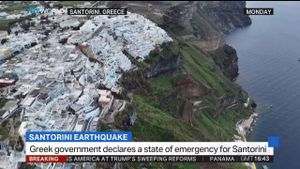On February 6, 2025, Morocco was struck by a devastating earthquake measured at magnitude 7.0, causing widespread destruction across various regions of the country. This disaster has ignited significant international concern and response efforts as communities grapple with the painful aftermath.
The earthquake's epicenter was identified near the coastal city of Agadir, impacting densely populated areas. Initial estimates indicate the quake resulted in over 1,200 fatalities and left millions displaced from their homes. Recovery operations commenced immediately, spearheaded by the Moroccan Red Crescent with support from global humanitarian organizations.
Local hospitals faced overwhelming pressure to treat injuries sustained during the quake, which included broken bones, lacerations, and emotional trauma. Dr. Fatima Karim, chief surgeon at the Agadir Hospital, highlighted the dire need for medical supplies, stating, “We are doing our best, but we need more help rapidly to save lives.” This statement echoes across the region, making it clear how critically assistance is required.
Many survivors have been left homeless, leading to the establishment of temporary shelters funded by both the Moroccan government and international aid. These shelters provide basic necessities but struggle to accommodate the influx of displaced individuals. Community leaders have been working tirelessly alongside government officials to coordinate efforts, aiming to restore normality as quickly as possible.
The Moroccan government declared three days of national mourning as the first step to honor the victims. Spokesperson Ahmed al-Mansouri stated, “The loss we feel as a nation is immense, but we must unite to support those affected and rebuild our communities.” His comments reflect the determination among officials to tackle the disaster head-on.
International support has rolled in, with countries offering aid packages ranging from food and water supplies to logistics and volunteer personnel. The United Nations has also mobilized to provide direct assistance, sending emergency teams to help set up medical facilities and coordinate aid.
Meanwhile, the quake has resurfaced discussions on Morocco's preparedness for natural disasters. Experts have criticized the country for insufficient infrastructure to cope with seismic activities, which are not uncommon in the region. Dr. Samira Lahlou, a geologist at the Moroccan Institute of Earth Sciences, remarked, “We must learn from this tragedy to improve our building codes and emergency response plans to mitigate the impacts of future disasters.”
Efforts are currently underway to assess the full extent of the damage and to develop comprehensive plans for long-term recovery and rebuilding strategies. The Minister of Infrastructure, Khalid Reda, assured the public, “We are committed to ensuring every affected area receives the support needed to rebuild not only our structures but the lives of our people.” His promise highlights the government's role during this trying period.
Despite the overwhelming challenges, stories of resilience and community spirit are beginning to emerge. Neighbors have come together to assist those whose homes were destroyed, offering food and shelter. Malik Ali, who lost his family home, expressed gratitude for the support, saying, “Our community is our strength. Together, we will rebuild.” Such sentiments demonstrate the unity amid adversity, giving hope to many still coping with loss.
The long-term impact of the February 2025 earthquake on Morocco remains to be seen, as recovery efforts will likely take months, if not years, to fully materialize. Nevertheless, the dedication shown by local communities, the government, and international bodies reflects a concerted effort to overcome this disaster.
With recovery still underway, questions linger on how urban environments can be retrofitted or redesigned to withstand future seismic activity. Local authorities are expected to face intense scrutiny over building regulations and disaster readiness moving forward.
Through all of this, the Moroccan spirit shines brightly—one of resilience, communal solidarity, and unwavering hope for the future. The challenge ahead is immense, but with concerted effort and determination, recovery is possible.



